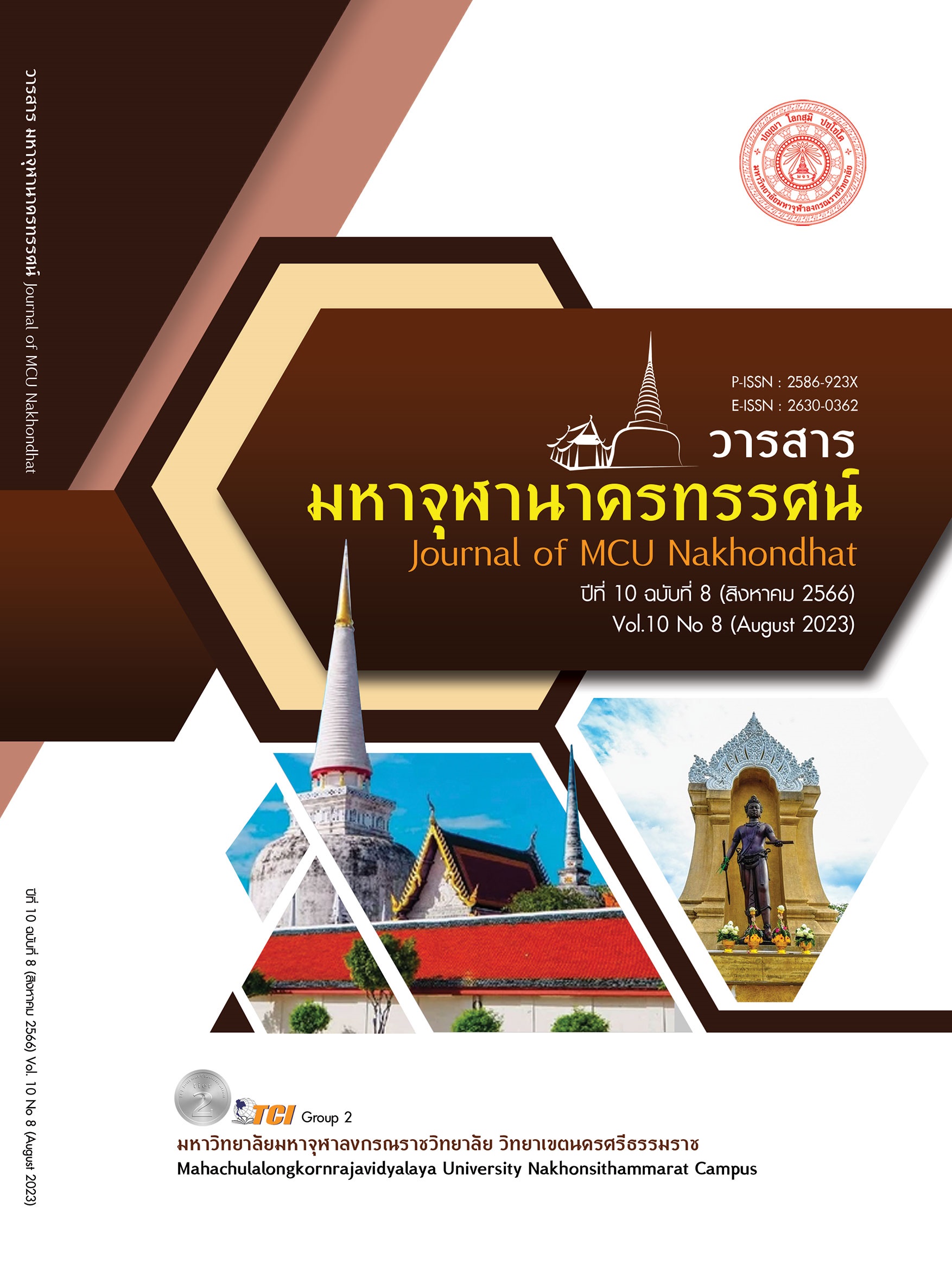A DEVELOPING A SELF-MANAGEMENT MODEL TO ENHANCED GLYCEMIC CONTROL FOR UNCONTROLLED DIABETIC PATIENTS
Main Article Content
Abstract
The purpose of this research was to 1) develop and study the effect of using a self-management model to promote glycemic control for diabetics with uncontrolled glycemic control. 2) compare the mean scores of self-management behavior. and mean blood sugar levels. It is a research and development model. The samples were 1) a group of nurses who worked to take care of 30 diabetic patients; 2) a group of 30 uncontrollable diabetic patients. Select a specific model according to the specified qualifications. The research instrument was a self-management model to promote glycemic control for uncontrolled diabetes patients developed by the researcher. The tools used to collect information include satisfaction assessment form and a questionnaire on self-management behaviors of diabetic patients with uncontrollable sugar. Qualitative data were analyzed and distribution of frequency, percentage, mean, Standard Deviation and paired t-test.The effect of using a self-management model to promote glycemic control for diabetics with inadequate glycemic control at Ban Pong Hospital after using pattern. The nursing group had an average score of satisfaction at a high level ( = 4.63, S.D. = 0.48) The mean scores of self-management behavior in the group of diabetic patients were significantly higher than before using the model at statistically significant level .05 had an average score of satisfaction at a high level ( = 4.39, S.D. = 0.52), the mean blood sugar level decreased than before using the model was statistically significant at the .05 level. The results of this research diabetic care nurse could apply this self-management model to promote glycemic control for uncontrollable diabetics can be applied to change behaviors appropriately and can control blood sugar levels in diabetic patients and can be applied to other groups of patients.
Article Details

This work is licensed under a Creative Commons Attribution-NonCommercial-NoDerivatives 4.0 International License.
References
กนกวรรณ ด้วงกลัด และคณะ. (2562). โปรแกรมการส่งเสริมการจัดการตนเองในผู้ป่วยเบาหวาน ชนิดที่ 2 ที่ควบคุมไม่ได้. วารสารวิจัยคุณภาพและการพยาบาล, 36(1), 66-83.
จันจิรา วิทยาบำรุง. (2563). ผลของโปรแกรมการจัดการตนเองต่อความรู้พฤติกรรมการจัดการตนเองและระดับน้ำตาลสะสมในเลือดของผู้ป่วยเบาหวานที่ไม่สามารถควบคุมระดับน้ำตาลในเลือดได้. วารสารพยาบาลศาสตร์และสุขภาพ, 43(4), 36-47.
ไชยา ท่าแดง. (2563). ผลของโปรแกรมการจัดการตนเองต่อการรับรู้สมรผลของโปรแกรมการจัดการตนเองต่อการรับรู้สมรรถนะแห่งตนพฤติกรรมการจัดการตนเองระดับน้ำตาลในเลือดและระดับน้ำตาลสะสมเกาะเม็ดเลือดแดงของผู้ที่เป็นโรคเบาหวานชนิดที่ 2. วารสารพยาบาลสงขลานครินทร์, 40(4)(ตุลาคม – ธันวาคม), 61-73.
ณัฐภัสสร เดิมขุนทด และคณะ. (2565). ผลของการให้ความรู้และสนับสนุนการจัดการตนเองของผู้ป่วยเบาหวานในผู้ป่วยเบาหวานชนิดที่ 2 ที่ควบคุมไม่ดี . วชิรสารการพยาบาล, 29(1), 1-23.
ธัสมน นามวงษ์ และคณะ. (2562). เรื่องการพัฒนารูปแบบการส่งเสริมการจัดการตนเองผู้ป่วยโรคเบาหวานที่ควบคุมระดับน้ำตาลไม่ได้. วารสารพยาบาลสาธารณสุข, 29(3), 179-193.
ปราณี ศรีสงคราม และคณะ. (2563). ผลของโปรแกรมการจัดการตนเองต่อพฤติกรรมการจัดการตนเองและระดับน้ำตาลในเลือดของผู้ป่วยเบาหวานชนิดที่ 2. วารสารอนามัยสิ่งแวดล้อมและสุขภาพชุมชน, 3(1)(มกราคม – เมษายน), 84-94.
สหพันธ์เบาหวานนานาชาติ. (2564). สถิติโรคเบาหวาน. เรียกใช้เมื่อ 24 กรกฏาคม 2565 จาก https://www.pptvhd36.com/health/news/2298
สำนักโรคไม่ติดต่อ กรมควบคุมโรค. (2563). ข้อมูลโรคไม่ติดต่อ กองโรคไม่ติดต่อกรมควบคุมโรคกระทรวงสาธารณสุข. เรียกใช้เมื่อ 24 กรกฏาคม 2565 จาก http://www.thaincd.com/2016/mission3
อัมพรทิพย์ อุตทาโท. (2564). การพัฒนารูปแบบการจัดการตนเองในการปรับเปลี่ยนพฤติกรรมผู้ป่วยเบาหวานที่ควบคุมระดับน้ำตาลในเลือดไม่ได้โรงพยาบาลส่งเสริมสุขภาพตำบลบ้านดอกคำใต้ ตำบลแม่ตีบอำเภองาว จังหวัดลำปาง. เชียงรายวารสาร, 13 (1), 136-151.
Glasgow, R. et al. (2002). Self-management aspects of the improving chronic illness care breakthrough series: Implementation with diabetes and heart failure teams. Annals of Behaviral Medicine, 24(2), 80-87.
Glasgow, R. et al. (2006). Assessing delivery of five “As” for patient –centered counselling. Health promotion International, 21(3), 245-255.


